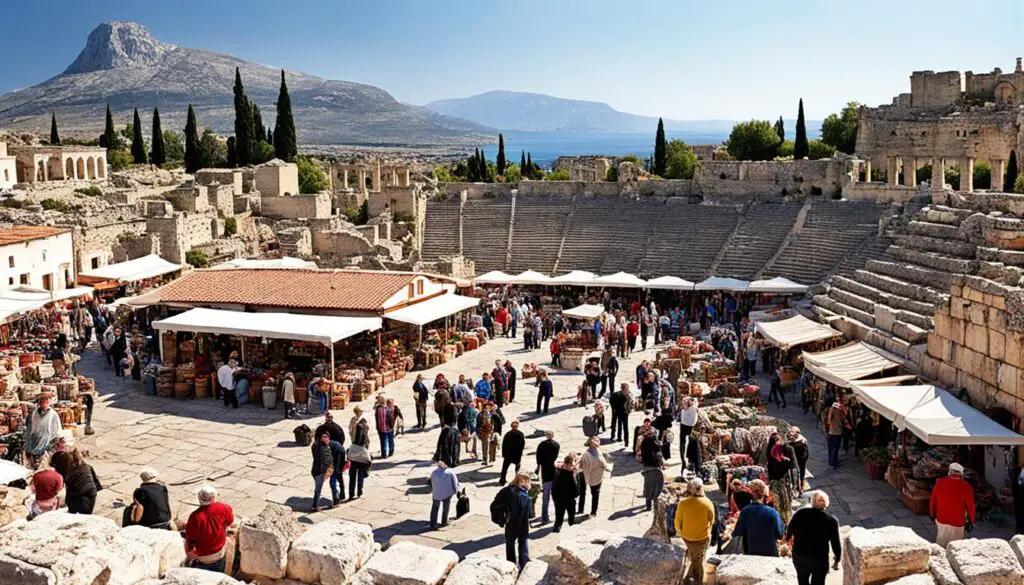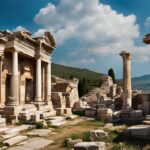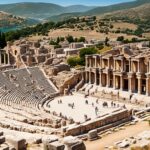Corinth, a city of historical significance, holds a special place in the Bible. This vibrant city, located in Greece on the Isthmus of Corinth, played a crucial role in shaping the early days of Christianity. One of the key figures associated with Corinth is the apostle Paul, who spent significant time in this city during his missionary journeys.
The Corinthian church, established by Paul, faced various challenges and issues, which he addressed in his letters to the Corinthians. These letters, known as 1 Corinthians and 2 Corinthians, provide valuable insights into the historical context, significance, and biblical references related to Corinth.
Join us as we delve into the world of Corinth in the Bible, exploring its geographical location, historical importance, archaeological discoveries, and the theological themes discussed by Paul. Discover the lessons we can learn from the Corinthian church and the enduring relevance of its teachings in the present day.
Key Takeaways:
- Corinth, located in Greece, was a significant city in the ancient Roman world and played a vital role in early Christianity.
- The apostle Paul established the Corinthian church and wrote letters, 1 Corinthians and 2 Corinthians, addressing various issues within the church.
- Archaeological excavations in Corinth have unearthed fascinating artifacts and structures, shedding light on the city’s history and culture.
- Theological themes discussed in Corinthians, such as unity, spiritual gifts, love, and Christian freedom, provide valuable insights into the early development of Christian theology.
- The Corinthian church’s challenges and interactions with Paul offer lessons on faith and navigating the cultural practices of the time.
Historical Significance of Corinth
Corinth, an ancient city of great historical significance, played a crucial role in the Roman province of Achaia. Situated on the isthmus, Corinth was a vital transit point for trade between Europe and Asia, making it strategically important in the ancient world.
This bustling city was not only a hub of commerce but also a center of wealth and influence in the region. Its location on the isthmus allowed Corinth to control the flow of trade, securing its position as a key player in the ancient Roman world.
“Corinth’s strategic location made it a crucial city in ancient times, connecting major trade routes and facilitating the exchange of goods and ideas.”
As the capital of the Roman province of Achaia, Corinth held even greater significance. It served as the administrative and political center, consolidating its power and influence over the surrounding territories.
The historical significance of ancient Corinth cannot be understated. Its strategic location, wealth, and status as the capital of Achaia elevated its prominence and ensured its lasting impact on the region and beyond.
| Key Points | Details |
|---|---|
| Geographical Location | Located on the isthmus between mainland Greece and the Peloponnese peninsula. |
| Trade and Commerce | A major transit point for trade between Europe and Asia. |
| Roman Province of Achaia | Served as the capital and administrative center. |
| Power and Influence | Wealthy and influential in the ancient Roman world. |
Geographical Location of Corinth
Corinth was situated on the Isthmus of Corinth, a narrow strip of land that connected the Peloponnese peninsula with mainland Greece. This strategic location made Corinth a vital hub for trade and transportation between Europe and Asia.
The city controlled two harbors: Cenchreae on the eastern side and Lechaeumon on the western side. These harbors facilitated maritime commerce and further enhanced Corinth’s economic prosperity.
Additionally, Corinth was protected by the Acrocorinthus, a massive monolithic rock that overlooked the city. The Acrocorinthus served as a natural fortress, providing defensive advantages to the inhabitants of Corinth.

Location and Features of Corinth
| Geographical Location | Features |
|---|---|
| Isthmus of Corinth | Narrow strip of land connecting Peloponnese to mainland Greece |
| Cenchreae | Eastern harbor of Corinth |
| Lechaeumon | Western harbor of Corinth |
| Acrocorinthus | Massive monolithic rock serving as a protective fortress |
Archaeological Discoveries in Corinth
Archaeological excavations in ancient Corinth have provided fascinating insights into the rich history of this ancient city. Through meticulous excavation, numerous artifacts and structures have been unearthed, shedding light on the daily life, trade, and cultural practices of the ancient Corinthians.
Among the remarkable archaeological discoveries in Corinth are:
- Temples: Impressive temples dedicated to various gods and goddesses, including the Temple of Apollo and the Temple of Octavia, have been uncovered. These religious structures offer a glimpse into the spiritual beliefs and practices of the Corinthians.
- Theaters: The ancient Corinthians enjoyed theatrical performances, and the remains of theaters, such as the Odeon and the Theater of Corinth, have been found. These theaters served as venues for entertainment and cultural gatherings, highlighting the importance of performing arts in Corinthian society.
- Marketplaces: Excavations have revealed bustling marketplaces where trade and commerce thrived. These marketplaces, such as the Lechaion Road and the Agora, were central to the economic activities of ancient Corinth.
- Villas: Intricate villas adorned with beautiful mosaics and frescoes have been discovered, offering a glimpse into the opulent lifestyles of the elite class. These villas provide valuable insights into the architecture and domestic life of the ancient Corinthians.
- Fortifications: The strategic location of Corinth necessitated robust fortifications for defense. Archaeologists have uncovered remnants of ancient walls, towers, and gates, showcasing the city’s defensive infrastructure.
These archaeological finds offer a tangible connection to the past, allowing us to piece together the historical puzzle of ancient Corinth. They provide valuable evidence for understanding the city’s social, economic, and religious dynamics.
“Archaeology gives us a unique window into the lives and experiences of those who lived in ancient Corinth. These discoveries enable us to walk in the footsteps of the Corinthians and gain a deeper appreciation for their culture and heritage.” – Archaeologist Sofia Mitchell
The excavation of ancient Corinth continues to uncover new treasures and deepen our understanding of this historically significant city.
Key Archaeological Discoveries in Corinth
| Discovery | Description |
|---|---|
| Temples | Impressive religious structures, including the Temple of Apollo and the Temple of Octavia, provide insights into Corinthian religious practices. |
| Theaters | Ancient theaters, such as the Odeon and the Theater of Corinth, highlight the importance of performing arts in Corinthian society. |
| Marketplaces | Bustling marketplaces, such as the Lechaion Road and the Agora, give us an understanding of ancient Corinth’s economic activities. |
| Villas | Intricate villas with mosaics and frescoes offer valuable insights into the lifestyles of the elite class in Corinth. |
| Fortifications | Remnants of ancient walls, towers, and gates highlight the city’s defensive infrastructure. |
Theological Themes in Corinthians
The letters of 1 and 2 Corinthians address a variety of theological themes, providing valuable insights into Pauline theology and the early development of Christian beliefs. These themes shed light on the challenges faced by the Corinthian church and offer guidance for believers today.
1. Unity and Division within the Church
“I appeal to you, brothers and sisters, in the name of our Lord Jesus Christ, that all of you agree with one another in what you say and that there be no divisions among you, but that you be perfectly united in mind and thought.” – 1 Corinthians 1:10 (New International Version)
In Corinthians, Paul addresses the issue of division within the Corinthian church, emphasizing the importance of unity among believers. He encourages them to set aside their differences and work towards a common goal, promoting harmony and fellowship.
2. Role of Spiritual Gifts
“Now to each one the manifestation of the Spirit is given for the common good.” – 1 Corinthians 12:7 (New International Version)
Paul discusses the spiritual gifts bestowed upon believers by the Holy Spirit. He emphasizes that these gifts should be used for the benefit of the entire church community, highlighting the importance of cooperation and the diverse roles within the body of Christ.
3. Importance of Love
“And now these three remain: faith, hope and love. But the greatest of these is love.” – 1 Corinthians 13:13 (New International Version)
In one of the most famous passages in Corinthians, Paul emphasizes the supremacy of love. He describes love as the foundational virtue that should guide all aspects of the believers’ lives, including their interactions within the church and their relationships with others.
4. Concept of Christian Freedom
“‘I have the right to do anything,’ you say… ‘I have the right to do anything,’ but not everything is beneficial. ‘I have the right to do anything,’ but I will not be mastered by anything.” – 1 Corinthians 6:12 (New International Version)
Paul addresses the concept of Christian freedom and its limitations. He encourages believers to exercise their freedom responsibly, considering the impact of their actions on others and avoiding behaviors that may lead to bondage or harm to themselves or the community.
5. Resurrection of Believers
“For as in Adam all die, so in Christ all will be made alive.” – 1 Corinthians 15:22 (New International Version)
Paul discusses the resurrection of believers, affirming the Christian hope in life after death. He emphasizes the central role of Jesus Christ in the resurrection and the ultimate victory over sin and death that believers can anticipate through their faith.
Overall, the theological themes found in Corinthians provide a rich tapestry of teachings and guidance for believers. The letters serve as a foundation for understanding Pauline theology and offer timeless principles that are applicable in navigating the challenges and complexities of the Christian faith.

Key Biblical Events in Corinth
Corinth, mentioned in the Bible’s Acts of the Apostles, plays a significant role in the key biblical events that shaped early Christianity. One of the central figures in Corinthian history is the apostle Paul, who spent considerable time in the city, laying the foundation for the Corinthian church and addressing various issues through his letters.
Paul’s missionary journey to Corinth marked a pivotal moment in the spread of Christianity. His interactions, teachings, and experiences in Corinth hold immense significance for believers and provide valuable insights into the early development of the faith.
Establishment of the Corinthian Church
During his second missionary journey, Paul arrived in Corinth and dedicated himself to sharing the Gospel with the residents of the city. The establishment of the Corinthian church became a key biblical event as Paul worked tirelessly to spread the teachings of Jesus Christ and nurture a community of believers.
Through his efforts, Paul guided the Corinthian church in navigating the challenges of their cultural setting and addressing doctrinal issues that arose. His letters to the Corinthians, found in the New Testament, provide first-hand accounts of his teachings and guidance to the early Christian community in Corinth.
Teachings and Guidance to the Corinthian Church
In his letters, Paul addresses a range of topics and challenges faced by the Corinthian church. These include issues related to divisions within the church, spiritual gifts, moral conduct, and the resurrection of believers. His teachings and admonitions aimed to guide the Corinthians towards a deeper understanding of their faith and a more righteous way of living.
“Do you not know that your bodies are temples of the Holy Spirit, who is in you, whom you have received from God? You are not your own.” – 1 Corinthians 6:19 (NIV)
Paul’s letters provide invaluable insights into the struggles and triumphs of the Corinthian church, serving as a source of inspiration and instruction for Christians throughout history.

By examining the key biblical events in Corinth, we gain a deeper understanding of the early Christian community and the challenges they faced. These events not only shaped the Corinthian church but also leave a lasting impact on the development and practice of Christianity as a whole.
Cultural and Religious Practices in Corinth
Corinthian society was deeply influenced by a diverse array of cultural and religious practices. One prominent aspect of Corinthian culture was the worship of Aphrodite, the Greek goddess of love. The city was renowned for its temples dedicated to her, attracting devotees from far and wide. This religious practice played a significant role in shaping the social fabric of Corinthian society.
However, it is important to note that Corinth also had a reputation for its immoral surroundings. The city’s vibrant trade and cosmopolitan nature contributed to a permissive atmosphere where indulgence and excess were prevalent. Such cultural practices posed unique challenges for the Corinthian church in maintaining their faith in Christ amidst the allure of the surrounding environment.
The Corinthians were tasked with navigating the juxtaposition of their faith and the cultural practices of their society. The Apostle Paul, in his letters to the Corinthians, addressed these challenges and urged them to remain steadfast in their beliefs while engaging with their cultural context.
“Do not be deceived: ‘Bad company corrupts good morals.'” – 1 Corinthians 15:33
Paul’s teachings emphasized the importance of discernment and upholding a higher moral standard, even in the face of cultural pressures. The Corinthian church serves as an example for believers today, reminding us of the need to be grounded in our faith while being mindful of the cultural practices that surround us.

Cultural and Religious Practices in Corinth
| Cultural Practices | Religious Practices |
|---|---|
| Indulgence and excess | Worship of Aphrodite |
| Permissive atmosphere | Temples dedicated to various gods and goddesses |
Prophetic and Eschatological Significance of Corinth
Corinth holds prophetic and eschatological significance in the Bible. The letters of Paul to the Corinthians touch on eschatological themes such as the resurrection, the future judgment, and the hope of believers. These teachings provide guidance and encouragement to believers in their faith and understanding of the future.
“Listen, I tell you a mystery: We will not all sleep, but we will all be changed— in a flash, in the twinkling of an eye, at the last trumpet. For the trumpet will sound, the dead will be raised imperishable, and we will be changed.”
– 1 Corinthians 15:51-52
Paul’s letters to the Corinthians reveal the prophetic significance of Corinth and its eschatological implications. Believers in Corinth were encouraged to hold onto their faith, knowing that their ultimate hope lies in the resurrection and the future judgment.

| Prophetic Themes | Eschatological Teachings |
|---|---|
| The resurrection of believers | The trumpet sound and the transformation of believers |
| The future judgment | The hope of believers in the face of trials and challenges |
| The promise of eternal life | The assurance of victory over death through Christ |
Paul’s Letters to the Corinthians
Paul, an influential figure in early Christianity, wrote two significant letters to the Corinthians, which are included in the New Testament as 1 Corinthians and 2 Corinthians. These letters address various issues within the Corinthian church, offering theological teachings and guidance on Christian living.
In his first letter, 1 Corinthians, Paul tackles subjects such as divisions and conflicts within the church, immoral behavior, lawsuits among believers, marriage, and spiritual gifts. He emphasizes the importance of unity, love, and the resurrection of Christ.
“And now faith, hope, and love abide, these three; and the greatest of these is love.” – 1 Corinthians 13:13
Paul’s second letter, 2 Corinthians, reflects his deep concern for the Corinthian church. He defends his apostolic authority, addresses false teachers, and encourages the Corinthians to remain faithful amidst trials and sufferings. He also emphasizes the concept of reconciliation and highlights the surpassing glory of the new covenant in Christ.
Theological Teachings in Paul’s Letters
Paul’s letters to the Corinthians contain profound theological insights that continue to influence Christian doctrine and practice. His teachings on the body of Christ, the importance of love, the role of spiritual gifts in the church, the resurrection of believers, and the power of God’s grace resonate with believers throughout history.
Guidance on Christian Living
Paul’s letters also provide practical guidance for Christian living. He addresses ethical issues, offers advice on marriage and singleness, encourages believers to be generous in giving, and emphasizes the need for righteous conduct in the face of worldly temptations.
| Key Teachings in 1 Corinthians | Key Teachings in 2 Corinthians |
|---|---|
|
|
Paul’s letters to the Corinthians provide invaluable insights into the early Christian community, their struggles, and the teachings necessary for their spiritual growth. These letters serve as a timeless resource for all believers seeking to understand the challenges of Christian community and to live out their faith according to God’s principles.
Significance of Corinthian Church in Early Christianity
The Corinthian church holds immense significance in the early development of Christianity. Established by the apostle Paul, it was one of the earliest Christian communities, playing a pivotal role in shaping the theological and practical aspects of the faith.
Paul’s interactions with the Corinthians served as a catalyst for the growth and maturity of the Corinthian church. Through his letters, he addressed various challenges and issues faced by the early Christians, providing guidance and insights on how to navigate their newfound faith.
“For I delivered to you as of first importance what I also received: that Christ died for our sins in accordance with the Scriptures, that he was buried, that he was raised on the third day in accordance with the Scriptures…”
The challenges faced by the Corinthian church were not unique to their time. They dealt with issues such as division, immorality, misuse of spiritual gifts, and false teachings. Paul’s letters served as a source of encouragement, correction, and instruction, guiding the Corinthians in their pursuit of a Christ-centered life.
The experiences of the Corinthian church provide valuable insights into the early struggles and triumphs of the Christian community. Their journey of faith serves as a model for believers today, highlighting the importance of unity, love, and spiritual maturity.
Theological Themes
- The unity and division within the church
- The role of spiritual gifts in the body of Christ
- The importance of love as the foundation of Christian living
- The concept of Christian freedom in Christ
- The resurrection of believers and the hope of eternal life
The theological themes addressed in Paul’s letters to the Corinthians continue to shape the understanding of Christian doctrine and practice today. They offer guidance and instruction that remains relevant in navigating the challenges of the modern world.
The Corinthian church’s significance goes beyond its historical context. It serves as a reminder of the enduring power of the gospel message and the transformative work of Christ in the lives of believers. The struggles and triumphs of the Corinthians inspire and encourage Christians to persevere in their faith and live out the teachings of Jesus Christ.
Bible Verses about Corinth
Throughout the Bible, there are several verses that reference Corinth and the Corinthian church. These verses offer valuable insights, teachings, and instructions related to Corinth’s significance in the biblical narrative.
1. 1 Corinthians 1:2
“To the church of God in Corinth, to those sanctified in Christ Jesus and called to be his holy people, together with all those everywhere who call on the name of our Lord Jesus Christ—their Lord and ours.”
In this verse, Paul specifically addresses the Corinthian church and emphasizes their sanctification in Christ Jesus. It highlights the importance of unity among believers and their shared identity as followers of Jesus.
2. Acts 18:1-3
“After this, Paul left Athens and went to Corinth. There he met a Jew named Aquila, a native of Pontus, who had recently come from Italy with his wife Priscilla, because Claudius had ordered all Jews to leave Rome. Paul went to see them, and because he was a tentmaker as they were, he stayed and worked with them.”
In these verses, we see the historical context of Paul’s journey to Corinth and his encounter with Aquila and Priscilla. It gives us insights into Paul’s tentmaking profession and his relationship with this couple, who later became significant figures in the early Christian community.
3. 2 Corinthians 6:14
“Do not be yoked together with unbelievers. For what do righteousness and wickedness have in common? Or what fellowship can light have with darkness?”
Here, Paul addresses the Corinthian church, advising them against forming close partnerships or associations with unbelievers. It emphasizes the importance of maintaining a distinct Christian identity and avoiding compromises in matters of faith.
4. 2 Corinthians 4:5
“For what we preach is not ourselves, but Jesus Christ as Lord, and ourselves as your servants for Jesus’ sake.”
Within the Corinthian context, Paul clarifies his role as a servant of Jesus Christ and emphasizes that his preaching focuses not on himself but on proclaiming Jesus as Lord. It underscores the centrality of Christ and the humble servant leadership exhibited by Paul.
These are just a few examples of Bible verses that reference Corinth. By studying these verses and exploring the biblical narrative, we gain deeper insights into the significance of Corinth and the teachings specific to the context of the Corinthian church.
Conclusion
Corinth in the Bible holds immense historical, cultural, and theological significance. Through its location, archaeological discoveries, and biblical events, we gain valuable insights into the early development of Christianity. The city’s position as the capital of the Roman province of Achaia, its strategic importance in trade, and its diverse cultural and religious practices all contribute to its significance.
Paul’s letters to the Corinthians offer timeless guidance and teachings that continue to resonate today. His messages address various challenges and issues faced by the Corinthian church, providing valuable lessons on faith, unity, love, spiritual gifts, and Christian living.
The experiences of the Corinthians serve as a reminder of the challenges faced by early Christians. Their journey demonstrates the enduring power of the gospel message and the unwavering faith of believers in navigating cultural complexities and striving for spiritual growth.
In conclusion, Corinth in the Bible offers a wealth of insights and lessons that are still relevant in today’s world. From its historical context and archaeological discoveries to Paul’s letters and the experiences of the Corinthian church, we are presented with a remarkable tapestry of early Christianity. As we delve into these biblical narratives, we gain a deeper understanding of our own faith journeys and the enduring impact of the gospel message.







